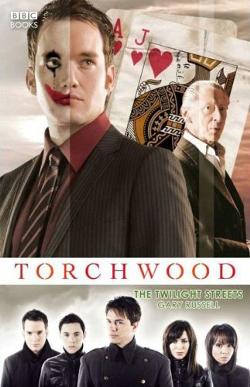The Twilight Streets
A Torchwood Novel

|
|
BBC Books The Twilight Streets A Torchwood Novel |

|
| Author | Gary Russell |  |
| Published | 2008 |
| Synopsis: It's the start of a Cardiff autumn - the days are getting shorter, the dark evenings settling in. There's a part of Cardiff that no one goes to much. No crime, no murders, just they stay away. A collection of old rundown houses and gloomy streets. Something's not quite right there, something is off-kilter. Except now, the Council are renovating the area. And a new company have been employed to do this. And look: they're going to organise street parties to show off the gentrified area. Clown and face-painters for the kids, street magicians for the adults. None of this is Torchwood's problem. Except that Tosh recognises the man sponsoring the street parties when she's passing one day: Bilis Manger! |
A Review by Leslie McMurtry 13/7/14
By far the longest Torchwood novel and contributed by an experienced hand at Doctor Who-universe writing (Gary Russell), The Twilight Streets did not disappoint in its general reputation as one of the best, if not the best, of the Torchwood novels. Russell has a very assured handle on Torchwood characterization, especially that of Jack, and this novel is very much rooted in that Doctor Who universe: with sly references to Boom Town, Terror of the Zygons, possibly Smith and Jones, as well as a more obvious link: it is a sequel, in some senses, to End of Days. This is also a well-written novel with a lot of narrative devices that the "timey wimey" crowd will appreciate. I found it very enjoyable and a quick, satisfying read.
I like when Torchwood novels ground themselves in Cardiff history, as did Trace Memory (and Skypoint, a bit). The Twilight Streets offers glimpses of a pre-2000s Cardiff Torchwood which, despite myself, I found utterly intriguing. It's a guilty pleasure to imagine Jack in 1941 in a chaffeur-driven car saying, "The Hub, please, and don't spare the horses," as he picks up a Bakelite telephone built into the Daimler's dashboard. I would definitely watch (or read) Russell's version of Torchwood 1941.
There are several intriguing concepts in The Twilight Streets, and the return of the enigmatic Bilis Manger is the least of them (the back blurb makes the book seem to be about street parties, which is a little misleading). The fact that Jack seems to be on the inevitable road to atoning for "Revenge for the Future" is a nice twist for the ex-Time Agent. I also like the data files that Ianto painstakingly goes through for our benefit (which means a bit of exposition-crunch in 6 different fonts; ow, my eyes), which lend a real sense of depth and verisimilitude to the story. It's all rather cinematic in prose form.
Russell takes the "adult" in Torchwood seriously, more so with the language and sexual content ("'Wonder what he looked like under that leather,' Jan giggled to one of the other girls. 'Looked good with it on! How tight were those leather trousers?' The other girl nodded. 'You couldn't just see he was a big boy, you could guess his religion!'" Do people really talk like that?) than the violence (as opposed to Something in the Water, for example, which was high on the gore and violence factor. I think this works because Russell captures Jack really well and can get away with being Captain of the Innuendo Squad. The book also tries to get inside Ianto's head, which it does in a rather amusingly quirky way (there's a really wonderful conversation with Gwen about Abba), and Ianto gets to be one of the most heroic characters (though, if I'm honest, I felt I understood his character slightly better in Trace Memory). Gwen, interestingly, is there for comic relief.
I have to confess I love what Russell has done with Owen and Toshiko. Not their characters in the action of the novel per se (although his Owen is quite amusing in a sarcastic kind of way), but the possible future that is revealed, and ultimately causes untold havoc, because of them. I don't want to give any more away, but it's a mind-blowing idea and is quite thought-provoking knowing what we know ultimately happens to them at the end of series 2 (and, as someone who ever-so-slightly ships them, I can report it's also intriguing in that sense).
The Twilight Streets, in many ways, foreshadows the end of series 2 and Children of Earth, which is always a good thing with which to be associated. "To hell with consequences, Bilis," Jack says toward the end. "If I stopped every time I opted to save human lives, stopped to think about who I was saving or what I was saving them from, I'd never move. Never decide. Be caught with an endless stream of possibilities, probabilities and maybes ahead of me." However, I will say that once again the cover is misleading, and in quite an annoying way as I thought Bilis was going to turn out to be the Celestial Toymaker. (Or is he?)